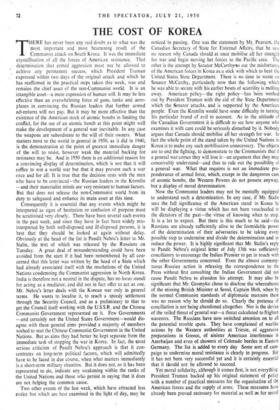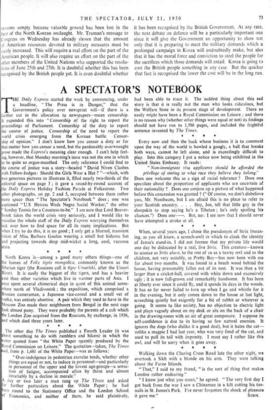THE COST OF KOREA
THERE has never been any real doubt as to what was the most important and most heartening result of the Communist attack on South Korea. It was the immediate crystallisation of all the forces of American resistance. That determination that armed aggression must not be allowed to achieve any permanent success, which President Truman expressed within two days of the original attack and which he has reaffirmed in the practical steps taken this week, was and remains the chief asset of the non-Communist world. It is an intangible asset—a mere expression of human will. It may be less effective than an overwhelming force of guns, tanks and aero- planes in convincing the Russian leaders that further armed adventures will not pay. But it may be more effective than the existence of the American stock of atomic bombs in limiting the conflict, for the use of an atomic bomb at this point might well make the development of a general war inevitable. In any case the weapons are subordinate to the will of their owners. What matters most to the world in general in 1950, as it did in 1940, is the demonstration at the point of greatest immediate danger of the will to resist, however weak the material backing for resistance may be. And in 1950 there is an additional reason for a convincing display of determination, which is not that it will suffice to win a world war but that it may prevent such a war once and for all. It is true that the decision rests with the men - who have to be convinced—the Russian leaders in the Kremlin —and their materialist minds are very resistant to human factors. But that does not release the non-Communist world from its duty to safeguard and enhance its main asset at this time.
Consequently it is essential that any events which might be interpreted as signs of hesitation or confusion of purpose must be scrutinised very closely. There have been several such events in the past week, and since they have in fact been widely mis- interpreted by both well-disposed and ill-disposed persons, it is best that they should be looked at again without delay. Obviously at the head of the list is Pandit Nehru's letter to Mr. Stalin, the text of which was released by the Russians on Tuesday. A great deal of misunderstanding .could have been avoided from the start if it had been remembered by all con- cerned that this letter was written by the head of a State which had already associated itself with the resolutions of the United Nations condemning the Communist aggression in North Korea. India is therefore not a neutral in the dispute, has no locus standi for acting as a mediator, and did not in fact offer to act as one. Mr. Nehru's letter deals with the Korean war only in general terms. He wants to localise it, to reach a speedy settlement through the Security Council, and as a preliminary to that to get the Council itself working with the U.S-.S.R. and the Chinese Communist Government represented on it. Few Governments —and certainly not the United States Government—would dis- agree with these general aims provided a majority of members wished to seat the Chinese Communist Government in the United Nations. But as aims they had better be kept separate from the immediate task of stopping the war in Korea. In fact, the most serious criticism of Pandit Nehru's approach is that it con- centrates on long-term political factors, which will admittedly have to be faced in due course, when what matters immediately is a short-term military situation. But it does not, as it has been represented to do, indicate any weakening within the ranks of the United Nations and those who persist in saying that it does are not helping the common cause.
Two other events of the last week, which have attracted less notice but which are best examined in the light of day, may be noticed in passing. One was the statement by Mr. Pearson, the Canadian Secretary of State for External Affairs, that he saw no reason why Canada should at once mobilise all her strength for war and begin moving her forces to the Pacific area. The other is the attempt by Senator McCarthrto use the misfortunes of the American forces in Korea as a stick with which to beat the United States State Department. There is no time to waste on Senator McCarthy, particularly now that the following which he was able to secure with his earlier bouts of scurrility is melting away. American policy—the right policy—has been worked out by President Truman with the aid of the State .Department which the Senator attacks, and is supported by the American people. Even the Kremlin would have some difficulty in turning his particular brand of evil to account. As to the attitude• of the Canadian Governrttent it is difficult to see how anyone who examines it with care could be seriously disturbed by it. Nobody argues that Canada should mobilise all her strength for war. In fact the whole point of the stand taken by the United Nations in Korea is to make any such mobilisation unnecessary. The objects are to end the fighting, to demonstrate to the Communists that if a general war comes they will lose it—an argument that they may conceivably understand—and thus to rule out the possibility of a general war. What that requires is not an immediate pre- ponderance of armed force, which, except in the dangerous case of atomic bombs, the Western Powers do not possess anyway, but a display of moral determination. Now the Communist leaders may not be mentally equipped to understand such a determination. In any case, if Mr. Stalin sees the full significance of the American stand in Korea he will be displaying a virtue which has not been vouchsafed to the dictators of the past—the virtue of knowing when to stop. It is a lot to expect. But there is this much to be said—the Russians are already sufficiently alive to the formidable power of the determination of their adversaries to be taking every possible step to undermine and divide the determination and so reduce the power. It is highly significant that Mr. Stalin's reply to Pandit Nehru's original letter of July 13th was sufficiently conciliatory to encourage the Indian Premier to get in touch with the other Governments concerned. Even the almost contemp- tuous Russian action in releasing the correspondence to the Press without first consulting the Indian Government did not cause Pandit Nehru to abandon his attempt It may also be significant that Mr. Gromylco chose to disclose the whereabouts of the missing British Minister at Seoul, Captain Holt, when by the normal Communist standards of diplomatic manners there was no reason why he should do so. Clearly the pretence of conciliation is not being abandoned altogether. Nor is the device of the veiled threat of general war—a threat calculated to frighten waverers. The Russians have now switched attention on to all the potential trouble spots. They have complained of warlike actions by the Western authorities at Trieste, of aggressive preparations in Greece, of sinister American interference in Azerbaijan and even of. showers of Colorado beetles in Eastern Germany. The list is added to every day Some sort of cam- paign to undermine moral resistance is clearly in progress. But it has not been very successful yet and it is certainly essential that it should not be allowed to succeed.
Yet moral solidarity, although it comes first, is not everything. President Truman backed up his original statement of policy with a number of practical measures for the organisation of the American forces and the supply of arms. These measures have already been proved necessary for material as-well as for moral



































 Previous page
Previous page